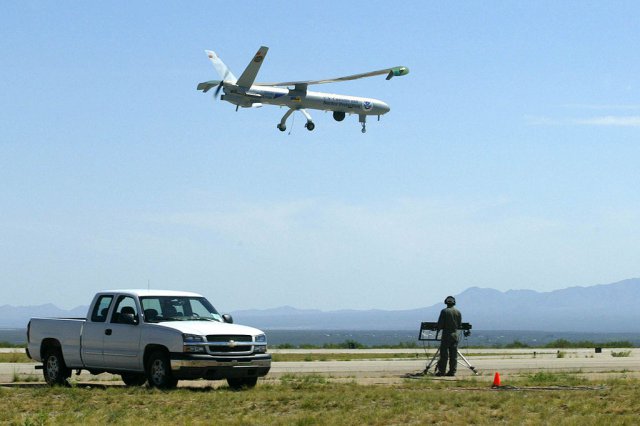 An undercover operation by Homeland Security agents thwarted a Pakistani man’s attempt to buy gyroscopes and other electronics from a Tucson-based company and export them under falsified documents to Pakistan for use in that country’s military drone program.
An undercover operation by Homeland Security agents thwarted a Pakistani man’s attempt to buy gyroscopes and other electronics from a Tucson-based company and export them under falsified documents to Pakistan for use in that country’s military drone program.
Syed Vaqar Ashraf, 71, was sentenced to 33 months in prison and three years supervised release Thursday by U.S. District Court Judge Rosemary Márquez after Ashraf pleaded guilty in August for violating arms control laws that prohibit the export of “defense articles” deemed critical to national security.
According to court documents, in June 2012 Ashraf—also known as Vaqar A. Jaffrey— began asking a Tucson-based company for price quotes on unmanned aerial vehicles, otherwise known as drones.
The company immediately tipped off agents with Homeland Security Investigations, part of U.S. Immigration and Customs Enforcement, about Ashraf’s requests, said Chad Plantz, assistant special agent in charge of the agency’s Tucson office.
Plantz said that he could not identify the company, but said employees contacted HSI after they received Ashraf’s requests. Plantz credited this to a program know as Shield America, which briefs employees of defense contractors and technology firms about the need to protect some export technology, he said.
HSI assigned special agents to work undercover and pose as the representative of a company that handles defense and security-related exports for a Tucson-based company. The company specializes in the design, development and manufacturing of drones for the U.S. military, said Andrew Simboli, a HSI special agent in an affidavit filed with the court.
In a series of emails from June 2012 to August 2014, Ashraf negotiated with Simboli as the head of I&E International, based in Lahore, Pakistan, over an agreement to purchase 18 gyroscopes intended to help medium-sized drones fly longer distances. Ashraf also tried to broker a deal for 10 optical receiver modules and laser diodes intended to be installed in the aircraft.
Some of these gyroscopes have been exported to Israel for installation in Hermes 450 UAV, built by the Israeli company Elbit for that country’s defense ministry. The Hermes 450 was tested by U.S. Customs and Border Protection in 2004 before the agency settled on larger Predator and Reaper drones.
In September 2013, HSI agents with assistance from the FBI, set up a face-to-face meeting with Ashraf in Vienna, Austria, to work out details of the sale. During the meeting Ashraf told agents that Pakistan’s nuclear program had been developed using technology exported from the west without a license, Plantz said.
It soon became clear to agents that Ashraf was working for Pakistan’s Advanced Engineering Research Organization, which intended to the electronics for the country’s own military UAV program.
In a deal worth around $440,000, Ashraf arranged the purchases and asked the items to be shipped to Pakistan through Belgium and agreed to swap out the description of the items in shipping documents to avoid U.S. export controls.
Simboli went forward with the deal, and requested a license from the Commerce Department, which told him that the items were classified under export controls for anti-terrorism reasons and that a special license would be required for export because the optical receiver modules could be used in “activities related to nuclear, chemical or biological weapons or missile delivery systems.”
From January to March 2014, Ashraf asked for suggestions to get around the export controls, asking for alternative descriptions that would appear to cover the items on documents, but would clear arms control hurdles from the State and Commerce departments.
Over the next three months, Simboli offered alternative descriptions and asked Ashraf by email if his customer was aware that the transaction was “being done without a license.” Ashraf told him that they were “absolutely aware of everything,” Simboli told the court.
“He is well aware that he cannot get these gyros in a normal way; he’s well aware of that,” Ashraf wrote in an email.
Later, Ashraf requested the 10 optical receiver modules, and Simboli submitted those through the same with the Commerce Department, who responded that these items were also controlled items.
Simboli gave Ashraf three options: return his deposit of $2,785 to his customer, apply for an export license in accordance with the law, or “transship the modules” through a third country with their description replaced by items not covered by federal and international law.
Ashraf “requested that the models be trans-shipped along with the above-mentioned gyros,” Simboli said.
Over the next few months, Simboli and Ashraf agreed to a series of wire-transfers, including one worth $67,000 through a Tucson-area bank, to secure the equipment, Plantz said.
HSI agents met with Ashraf three more times in face-to-face meetings, including one in the United States, Plantz said.
On August 26, 2014, agents set up a meeting with Ashraf and two members of AERO to handover some of the technology, but before the meeting could take place, Belgian police moved in and arrested Ashraf.
Ashraf was later extradited from Belgium on July 31, 2015, to the United States to face trial, Plantz said.
HSI is charged with enforcing U.S. export laws, said Plantz, and remains the only federal agency that can fully regulate “dual-use” commodities, or technology that can be used for both civilians and foreign militaries, Plantz said.
“We take counter-profileration seriously and we put up a lot of resources,” Platz said. Over the years, the amount of attempts to export technology illegally has gone down, but it remains a significant government effort, Plantz said.
Ashraf will be deported to Pakistan after he completes his sentence, Platz said.
Photo: A Hermes 450 drone takes off while undergoing testing flights with U.S. Customs and Border Protection.
Source: Tucson Sentinel
